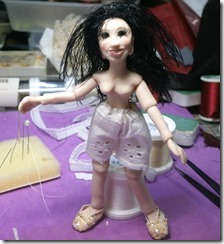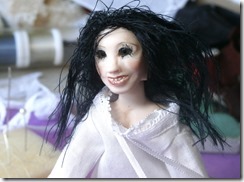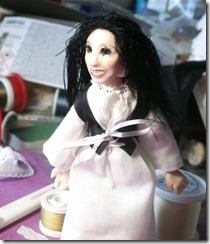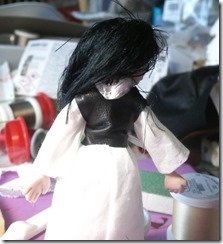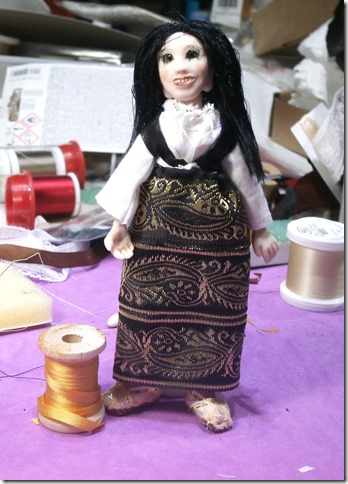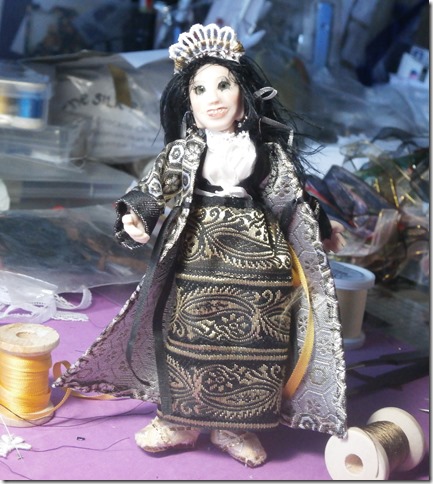I think I might be beginning to recover, mainly from lack of sleep.
I never sleep the night before Miniatura and I believe few other exhibitors do either. The organisation required to build what is basically an entire shop on a table top is extreme. Plus, this is Miniatura. It is not any old show in a church hall, it is the premier craftsman show in the country, and, as this country has, in the current iteration of the hobby, been regarded as a world leader in craftsmanship – for goodness sake John Hodgson’s chairs were presented to Queen Elizabeth the Second, Terry Curran’s miniature pots were in a coffee table book of full size potters of importance of the twentieth century – we are good at this.
There are more original artists at Miniatura working in any medium than anywhere else you can find. If they were expanded to full size and each had a room at Tate Modern, or any other museum, it would be the most famous exhibition of art on the planet. The hall is full of people who can bring an idea they have had, which is just some electrical impulses in their brain, into actuality and put it on a table for you to buy. And, because the shoppers are sensible people spending their pocket money, there is no rubbish. If you attempted to exhibit a wrapped cliff or a pile of bricks or some ‘found’ art, first you wouldn’t get into the show anyway, but if you did you would spend the weekend watching the tumbleweed roll past.
It’s Miniatura, the visitors are as bright as the exhibitors and they know what they want.
Therefore many of us spend the night before the show wide awake, trying to remember what is it we forgot to do.
Sleep, mainly.
It takes me all of the allotted three hours in the hall on Friday afternoon to achieve a partial set up. I am putting out about a thousand items individually. I never finish on Friday. I get home at half past seven, eat something, check I’ve left my clothes out and the card reader is charged, then go to bed absolutely knackered having had weeks of eighteen hour days to get ready, I close my eyes and whoosh have I put the little bags behind the ornament stand, have I got enough dolls of many lands, are the easels secure…
It’s a relief when it’s five to six and I can switch the alarm off and get up. This time, dressed and outside to spend twenty minutes scraping the ice off the car. The frost got to my hair, which took on the aspect of a dandelion clock, so by the time I was actually in the hall working at speed, I was beyond exhausted, fatter than I have been for months from lack of exercise and looking like an explosion in a hair factory..
at which point the Observer magazine turned up wanting to interview, video and photograph me.
The photographer took an hour trying to photograph my face and proved singularly incapable of improving it in any way, though I give him credit for trying.
The journalist was absolutely lovely not least because she is a miniaturist. I can’t tell you how rare this is. The normal situation for anyone reporting on a show is to say at some point: these are dolls houses but you are adults. Or, the lady from the local paper just looks at you and you know the show is going to appear in print as quaint at best.
The recent emphasis on metal health has been quite helpful to us and our interests. For nigh on forty years I’ve been explaining in various locations and to my extended family why having such an absorbing hobby is a good idea. Every now and then someone appears at the show looking very puzzled. Elisabeth Causeret Bettler was told for years at full size pottery shows in France that she was doing it too small, then she came to Miniatura and found out that not only was there nothing wrong with her, she was a virtuoso miniaturist, she had just been exhibiting in the wrong show.
It is normal under stress to forget everything you know. When I was photographed, did I set the right dolls up nicely, as I’ve been doing for thirty three years? Don’t be silly. I was utterly consumed by the horrifying fact that someone wanted to photograph my elderly face, the one with the huge scar, the massive dark spot and, after a sleepless night, big enough eye bags to carry all your luggage home in.
However the journalist is a miniaturist and I found what I had found in fifteen years of interviewing exhibitors at Miniatura: we both speak miniature.
The world would be a better place if everyone spoke miniature and sweated the small stuff instead of invading Poland and similar pastimes.
Under normal circumstances on the Saturday night I sleep the sleep of the just exhibited. This time, of course I stayed awake with the adrenaline trickling out of my ears
So it has taken until today for this parrot to have landed. Having achieved splashdown and shuteye I now have to get everything ready for the next show. First I have to repack the table cloths, properly, and now I am concentrating on the boxes which I need to remake and the carrier bags I need to reorder. I have bought new rechargeable music lights and spent any other profits in various ways and when I have finished making boxes will start to examine the dolls and repack and make lists.
Before that I am going to get the shop here up and running in case the article does get printed. Having written for magazines I know that what gets printed is reliant on many other factors. The cardinal sin for any publication is to be boring; right now a lot of very interesting world news is occurring and changing, daily. But, just in case, the OH has volunteered to help me get the shop up and running and once he has learned how, to teach his elderly, wrinkled, scarred, sleep deprived mother, the one with the awful hair, how to do it.
So watch this space, I’ll tell you if as and when the shop is open, if as and where the article or (horrors) video is and then
and then it will all go back to normal, which is good because I have a couple of absolutely cracking ideas for the next show.
Just like every other exhibitor. If you are good enough to exhibit at Miniatura you will have wonderful exhibits, insufficient sleep and ideas you can get out of your head and into existence.
~~~~~~~~~~~~~

















